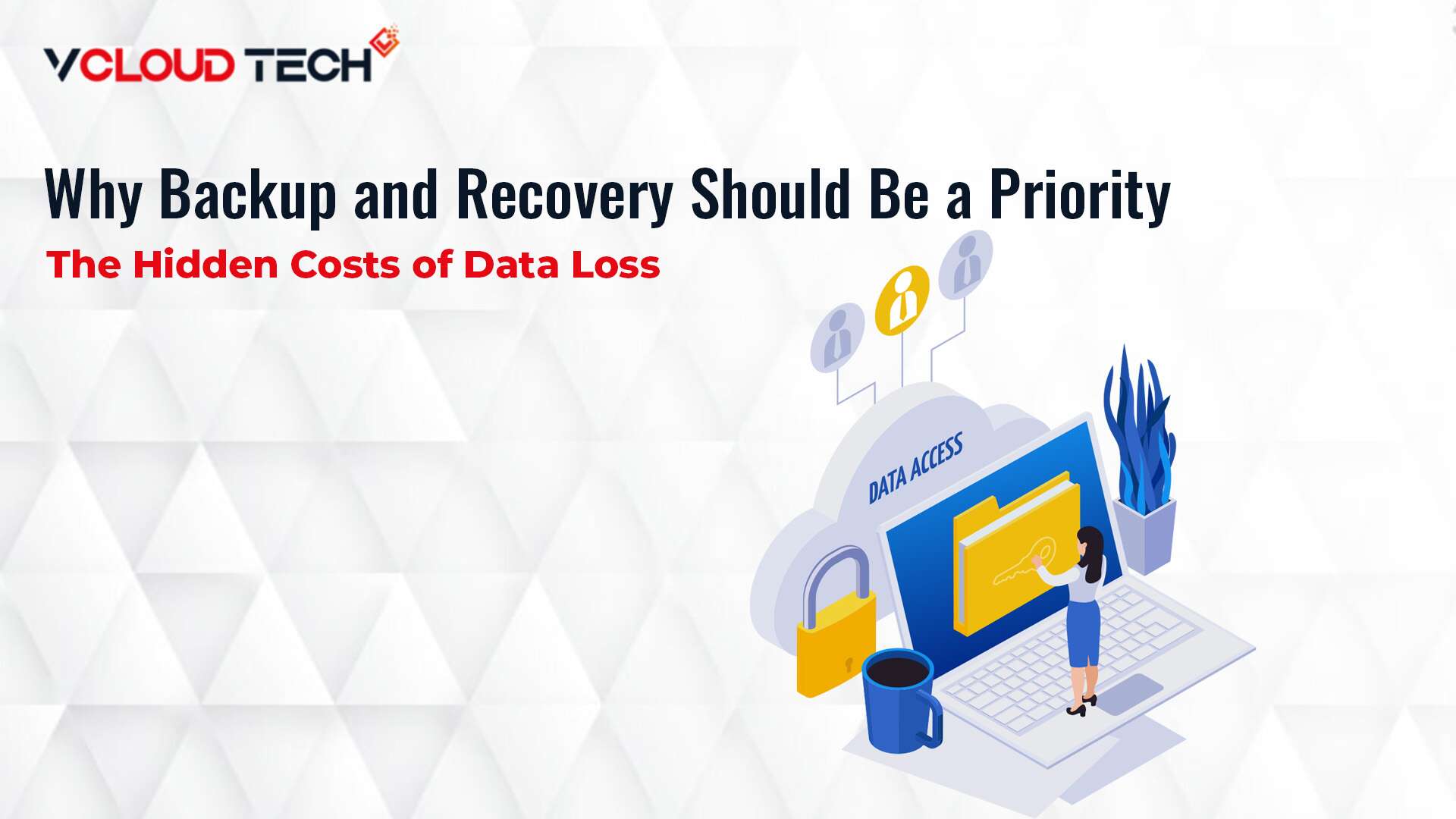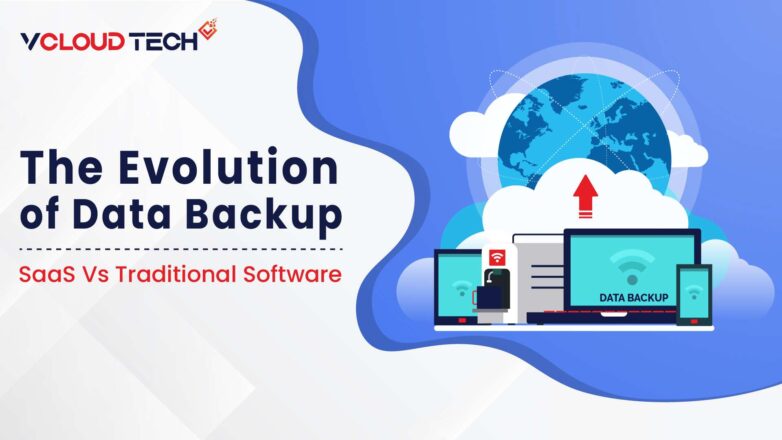The Hidden Costs of Data Loss
In today’s data-driven economy, organizations must protect their data and make it easy to recover from a disaster. According to the National Archives and Records Administration, 93% of businesses that experience data loss and downtime of 10 days or more file for bankruptcy within 12 months. It’s easy to see why Backing up data is critical for businesses. A solid backup and disaster recovery plan can protect your business from significant disruptions. Planning for failure is a necessity, not a luxury. Proper planning can significantly reduce the financial loss caused by downtime.
What are Backup and Recovery?
Backup and recovery consist of duplicating data, keeping it safe in case of loss or damage, and restoring that data to its original location or a secure alternate location to be used again in production. It is the process of Ideally, this backup copy (often called a snapshot) is immutable. That means that once created, it cannot be changed to protect against mutations such as ransomware. Backup and Recovery are also a category of onsite and cloud-based technology solutions that automate and support this process, allowing organizations to protect and store data for business and compliance reasons.
Backup and recovery are the processes of making and storing copies of data so businesses don’t lose their data. That is also called “operational recovery” at times. Most of the time, recovering from a backup means putting the data back where it was or elsewhere where it can be used instead of lost or broken data. A good backup copy is kept on a different system or device, like a tape, from the primary data in case the leading hardware or software fails and the data is lost.
What are the Types of Data Backup and Recovery?
Regarding Data Recovery, the backup method used will impact the recovery process. For example, a full backup allows for a complete system restore, but it takes longer than an incremental backup. An incremental backup requires the last full backup to be restored before the incremental backups can be restored. Differential backups need the previous full backup and the latest differential backup to be restored before the current differential backup can be restored.
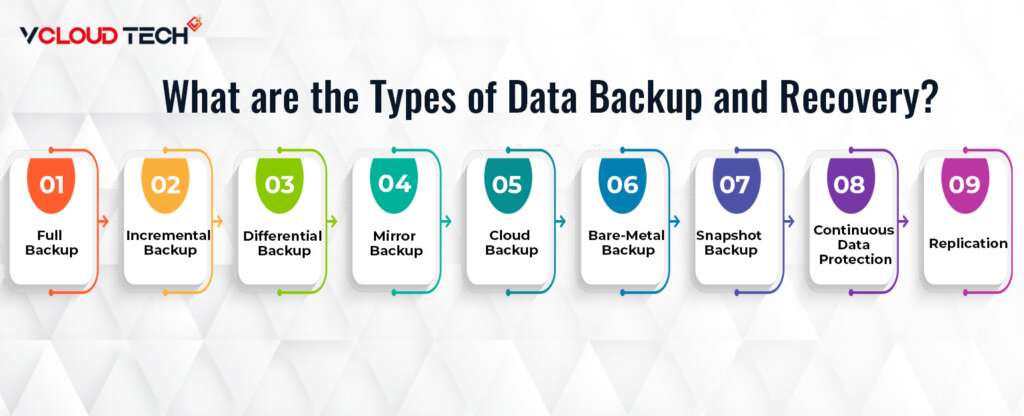
In addition to the backup method, the recovery process may involve different techniques, such as restoring from a local backup, a remote backup, or a Cloud Backup. It’s essential to have a comprehensive backup and recovery plan to ensure that data can quickly and easily be restored in case of a failure or disaster. There are several types of data backup and recovery methods, including:
Full Backup:
This method involves backing up all the data on a system, including files, applications, and settings. It is the most comprehensive backup method but takes the longest.
Incremental Backup:
Only the data that has changed since the last backup is back up with this method. This method is faster than a full backup but requires more storage space and time to restore data.
Differential Backup:
This method backs up all the data that has changed since the last full backup. It is faster than a full backup and requires less storage space than an incremental backup. However, it takes longer to restore data than an incremental backup.
Mirror Backup:
This method involves creating an exact copy of the original data stored on a separate device. This backup method is helpful for disaster recovery and ensures that data can be quickly restored in case of loss.
Cloud Backup:
This method involves backing data to a remote cloud server. It is helpful for remote workers and provides an offsite backup solution in a disaster.
Bare-Metal Backup:
This method involves backing up the entire system, including the operating system, applications, and data. It is useful for system recovery and can quickly restore the system to its previous state in case of system failure.
Snapshot Backup:
This method involves creating a snapshot of the system at a specific point in time. It is useful for creating a restore point for applications and files, allowing you to roll back changes if necessary.
Continuous Data Protection:
This method involves continuously backing up data as it changes. It is useful for systems that require constant availability and minimal data loss in case of failure.
Replication:
This method involves replicating data to another system or location, providing a redundancy solution in case of failure.
10 Factors Why Backup and Recovery is Important?
Backup and recovery are essential because they help to ensure that data can be restored in the event of data loss or corruption. That can happen for various reasons, such as hardware or software failure, human error, natural disasters, or cyber-attacks. Without proper backup and recovery measures, businesses can lose critical data, which can have severe consequences, such as financial loss, damage to reputation, or even legal liabilities.
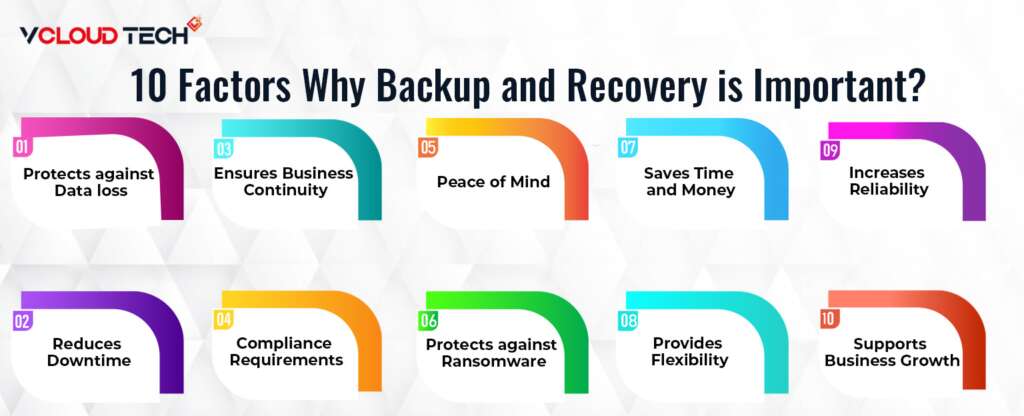
By regularly backing up data and having a recovery plan, businesses can quickly recover from data loss or corruption, minimize downtime, and avoid potential damages. Moreover, backup and recovery can also help businesses to comply with various regulatory requirements related to data retention and protection. Finally, it ensures the data is safe and accessible to authorized users whenever required. Therefore, Data Backup and recovery play a crucial role in ensuring the continuity of business operations and protecting critical data, making them an essential aspect of any organization’s data management strategy. Here are some key points that illustrate why backup and recovery are so important:
Protects Against Data Loss:
Backup and recovery solutions are designed to safeguard against data loss, which can occur due to various factors such as hardware failure, software errors, natural disasters, cyber-attacks, and human error. By backing up data regularly, businesses can ensure they have a copy of their data in case the original is lost or damaged.
Reduces Downtime:
Downtime can be costly for businesses, causing lost revenue and damaging reputation. By having a backup of critical data, businesses can quickly recover from a disruption, reducing the amount of downtime and minimizing the impact on operations.
Ensures Business Continuity:
Backup and recovery are essential for ensuring business continuity. With a reliable backup solution, businesses can recover from disasters quickly and effectively, minimizing the impact on operations and maintaining continuity.
Compliance Requirements:
Many businesses must comply with data protection regulations such as GDPR, HIPAA, and PCI DSS. Backup and recovery solutions can help businesses meet these requirements by ensuring that data is protected and recoverable in case of a breach or other incident.
Peace of Mind:
Knowing that data is backed up and can recover in case of an unexpected event can provide peace of mind to business owners and IT administrators, allowing them to focus on other important tasks and initiatives.
Protects Against Ransomware:
Ransomware Attacks are becoming increasingly common and can devastate businesses. By regularly backing up data, businesses can restore their systems to a previous state before the attack, mitigating the damage caused by the ransomware.
Saves Time and Money:
While investing in backup and recovery solutions may seem like an added expense, it can save businesses time and money in the long run. Recovering data from a backup is often quicker and less expensive than recreating lost data from scratch.
Provides Flexibility:
With backup and recovery solutions, businesses have the flexibility to restore data to a variety of locations, such as on-premises, in the cloud, or to a different physical location. That can be particularly useful in a disaster that affects a specific area or system.
Increases Reliability:
Backup and recovery solutions are designed to be reliable and often include features such as automatic backups, error checking, and redundant storage. That can increase the reliability of a business’s IT infrastructure and reduce the risk of data loss.
Supports Business Growth:
As businesses grow and add new systems and applications, backup and recovery solutions can help protect data across all environments. That can support business growth by providing a scalable and resilient IT infrastructure.
Why do you need a Data Backup and Disaster Recovery Plan?
A data backup and Disaster Recovery plan are essential for ensuring business continuity and protecting against critical data loss. Here are five compelling reasons to have a backup and DR plan:
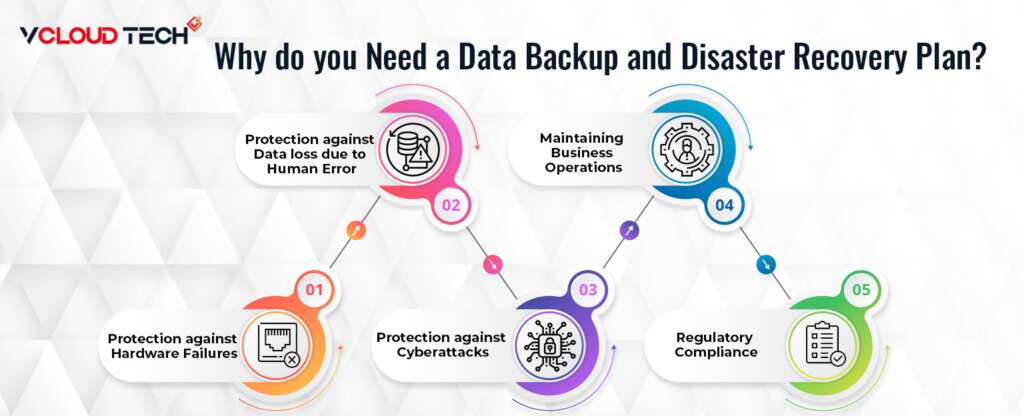
Protection against Hardware Failures:
Hardware failures can happen anytime, and it is essential to have a backup plan to ensure the data is safe.
Protection against Data Loss due to Human Error:
Human errors such as accidental deletion of files, formatting drives, and overwriting files can result in data loss. A backup plan ensures that the data can be restored quickly.
Protection against Cyberattacks:
Ransomware attacks, viruses, and other cyber threats can lead to data loss or system shutdowns. Acronis Cyber Cloud provides defense against such attacks.
Regulatory Compliance:
Regulatory bodies often require data backup and disaster recovery plans to ensure compliance with data protection regulations.
Maintaining Business Operations:
A well-designed backup and recovery plan helps ensure that business operations can continue despite a catastrophic event such as a natural disaster, cyberattack, or system failure.
Reach out to us and book a Free Consultation with vCloud Tech or chat with one of our representatives. Connect with us on Twitter, Facebook, Instagram, and LinkedIn for more information



